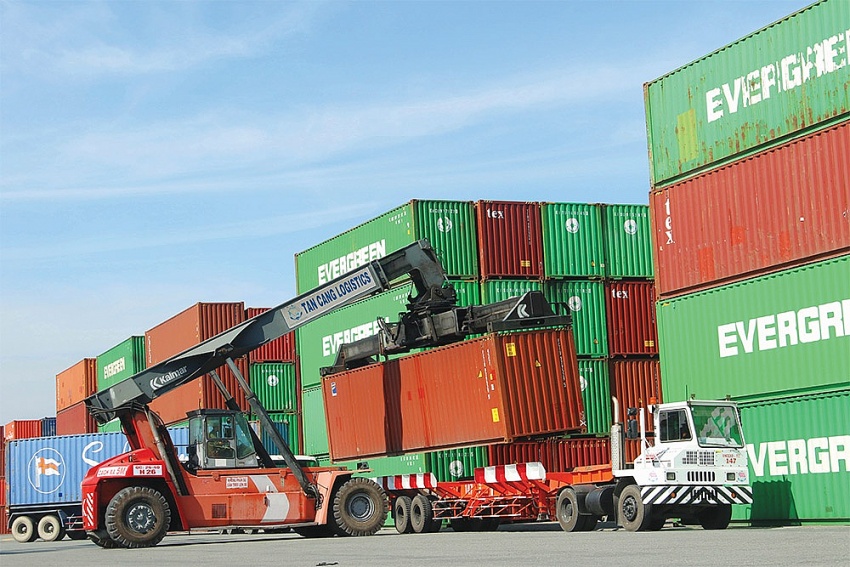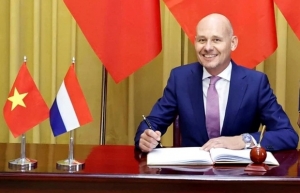Vietnam continues to be ASEAN highlight
 |
| Vietnam continues to be ASEAN highlight, Photo Le Toan |
Global analysts FocusEconomics last week released a forecast that ASEAN this year may grow 4.5 per cent this year, higher than the 4 per cent of last year.
“The consensus is for GDP growth in ASEAN to rise from 2023’s levels in 2024 on stronger tourism activity, lower inflation and interest rates, and the rebound of the global tech sector,” FocusEconomics said. “Nevertheless, muted activity in China and the El Niño knock-on effects will pose headwinds to growth. Weaker-than-expected external demand and geopolitical tensions pose downside risks.”
Amid this situation, FocusEconomics predicted that Vietnam will be ASEAN’s fastest-growing large economy in 2024, with a growth rate of 6 per cent, higher than 5.02 per cent last year (see chart). Vietnam has set a growth target of 6-6.5 per cent for 2024.
“In Q1/2024, our consensus is for GDP growth to pick up from Q4 2023 and be the fastest among ASEAN’s main economies, boosted by surging tourist arrivals and a nascent upturn in global electronics demand,” FocusEconomics added. “Looking at available data, merchandise exports and industrial output both surged in January, though the readings were flattered by Lunar New Year distortions.”
“Industrial output and goods exports will benefit from improving global electronics demand, and services activity will be supported by higher visitor arrivals,” the analysts said.
Vietnam’s General Statistics Office over a week ago reported that in the first two months of this year, the country’s index for industrial production (IIP) is estimated to have climbed 5.7 per cent on-year. The rate reduced 2.9 per cent in the same period last year.
Exports of electronics, computers, and spare parts hit $9.54 billion, up 34 per cent on-year, while exports of mobile phones and spare parts reached 9.58 billion, up 4.1 per cent.
Wanwisa Vorranikulkij, senior economist at the ASEAN +3 Macroeconomic Research Office (AMRO) based in Singapore, told VIR that Vietnam’s economic growth is set to stand on top of ASEAN this year. “Compared to other ASEAN countries, the 2023 growth remained on the high side,” Vorranikulkij said.
The AMRO projects Vietnam’s economic growth to rise to 6 per cent in 2024, higher than ASEAN’s average rate of 4.5 per cent. Growth in Vietnam will be led by the continued normalisation of retail goods inventory in the US, the recovery of the global semiconductor market, and stronger demand from the EU.
“We expect Vietnam to continue receiving more tourist arrivals, which would help boost consumption. Sustained inflows of foreign direct investment will also spur capital investment and employment,” Vorranikulkij continued.
According to the Foreign Investment Agency under the Ministry of Planning and Investment, as of February 20, the total newly registered capital, additional capital, and capital contributions and share purchases by foreign investors in Vietnam hit $4.29 billion, up 38.6 per cent on-year.
Also as of February 20, the nation had over 39,500 valid foreign-invested projects registered at $473.1 billion. Nearly $300 billion has been disbursed so far.
Andrea Coppola, lead economist for the World Bank in Vietnam, also said that given that global economic growth is expected to continue slowing in 2024, the GDP growth target between 6-6.5 per cent for 2024 is ambitious for Vietnam.
“Despite the global slowdown, demand for Vietnamese exports could gradually improve, and we project economic growth to slightly accelerate, but it will be challenging to reach 6 or 6.5 per cent unless domestic demand, consumption, and investment accelerate further,” Coppola said. “Local authorities can play an important role in supporting the economy though fiscal policy, particularly by accelerating the implementation of transformational public investment and infrastructure projects which are going to strengthen economic growth both in the short-term and in the longer term.”
Shantanu Chakraborty, country director for Vietnam of the Asian Development Bank (ADB), told VIR that it has maintained its projection for Vietnam’s growth in 2024 at 6 per cent, assuming certain recovery of the external sector, while domestic recovery could regain momentum, compared to 2023.
“An important driver will be prudent macroeconomic stability resulting from proactive monetary and fiscal policies, a continuity from 2023. But this alone would not be enough. Public investment, domestic consumption, and export recovery are the three main growth drivers of Vietnam’s economy in 2024,” Chakraborty said.
The ADB also forecast that ASEAN as a whole may grow by 4.7 per cent this year when the Philippines is predicted to see the highest growth of 6.2 per cent, followed by Vietnam.
In January, the Central Institute for Economic Management (CIEM) released two economic growth scenarios, expecting that the Vietnamese economy may perform more remarkably than last year, with better indexes.
Specifically, under the first scenario, the economy will grow 6.13 per cent, while the rate is 6.48 per cent for the second scenario.
According to the CIEM, the Vietnamese government has also made big breakthroughs in institutional reform, especially when it comes to improving policy frameworks for digital economy and circular economy, and regional connectivity, while having also boosted economic diplomacy to expand export markets and look for new resources for national development.
“Thanks to this, Vietnam has effectively dealt with negative impacts from the world market to ensure its macroeconomic stability and major balances, continuing to maintain and strengthen the confidence of both domestic and international investors,” said CIEM general director Tran Thi Hong Minh.
| Public investment is expected to accelerate. Temporary tax deferrals, cuts in environmental taxes, and cuts to VAT rates and car registration fees in the second half of 2023 will also provide some relief to businesses and households. However, frequent changes to tax rates and excessive use of deferrals add uncertainty to the tax system and can undermine tax collection. Some of the tax cuts are regressive and negatively impact climate and congestion. Instead, policies could focus on spending to address infrastructure and social needs. Vietnam’s medium-term strategy, including fiscal rules, provides a medium-term anchor to ensure sustainable debt. Further fiscal support could be considered, especially if the economic recovery disappoints. Given the slowdown and the constraints faced by monetary policy, going forward, fiscal policy can take a leading role in supporting aggregate demand. For instance, the government could scale up social safety nets - and consider cash transfers to provide swift relief to poorer households. Building on successful fiscal consolidation in recent years, there is fiscal space to provide further support. If the current turmoil proves more damaging to the economy and the financial sector, targeted support could be considered, including to help real estate developers restructure. To contain costs, it is recommended that any support goes through the budget, is temporary, and there are mechanisms in place to control and monitor risk exposure from guarantees or other contingent liabilities. The adoption of the global minimum corporate tax in 2024 will increase tax revenues but will require improvements to the investment climate. Vietnam could be among those most affected by the tax - as it has often granted tax incentives to multinational enterprises to attract foreign direct investment, including lower income taxes, that will be eroded. The effects of the higher tax can be compensated by improving the business environment, upgrading infrastructure, and enhancing human capital. Strengthening the fiscal framework and budget processes would increase transparency and enhance the quality and effectiveness of fiscal policy. The budget process is weakened by overly conservative revenue projections in recent years. A budget based on realistic projections and assessment of risks would allow to better decide on the appropriate fiscal space and level of spending and debt, while increasing transparency. The scope and duration of permitted carry-over spending could be more limited and ensure that all spending is integrated in the budget process. It would be important to accelerate efforts to strengthen macro-fiscal capacity (projections, risk assessment, impact of fiscal measures). Conducting expenditure reviews would help identify priorities and improve the quality of expenditures. Source: International Monetary Fund |
 | Royal visit underpins extension of investment ties Vietnam and the Netherlands have expanded their ties in agriculture, water management, and logistics in port and aviation development, coupled with fostering digital and semiconductor cooperation. |
 | New Zealand and Vietnam to advance cooperation Prime Minister Pham Minh Chinh’s visit to New Zealand will see both countries advance cooperation across a range of fronts, including economics, trade, education, and agriculture. |
 | Vietnam, NZ to pilot use of electronic quarantine certificates Vietnam and New Zealand signed a cooperation agreement to utilise electronic certificates in the veterinary field for the 2024-2026 period, witnessed by Vietnamese Minister of Agriculture and Rural Development Le Minh Hoan and New Zealand Minister of Agriculture Todd McClay on March 11. |
 | Vietnam’s stock market on the radar of Japanese investors Japanese investors expressed an interest in Vietnam’s stock market at a conference themed “Vietnam – Investment Destination” in Tokyo on March 12. |
What the stars mean:
★ Poor ★ ★ Promising ★★★ Good ★★★★ Very good ★★★★★ Exceptional
Related Contents
Latest News
More News
- Haiphong gains new growth impetus from strategic planning and integrated infrastructure (February 27, 2026 | 16:40)
- Kurz Vietnam expands Gia Lai factory (February 27, 2026 | 16:37)
- SK Innovation-led consortium wins $2.3 billion LNG project in Nghe An (February 25, 2026 | 07:56)
- THACO opens $70 million manufacturing complex in Danang (February 25, 2026 | 07:54)
- Phu Quoc International Airport expansion approved to meet rising demand (February 24, 2026 | 10:00)
- Bac Giang International Logistics Centre faces land clearance barrier (February 24, 2026 | 08:00)
- Bright prospects abound in European investment (February 19, 2026 | 20:27)
- Internal strengths attest to commitment to progress (February 19, 2026 | 20:13)
- Vietnam, New Zealand seek level-up in ties (February 19, 2026 | 18:06)
- Untapped potential in relations with Indonesia (February 19, 2026 | 17:56)

 Tag:
Tag:

















 Mobile Version
Mobile Version